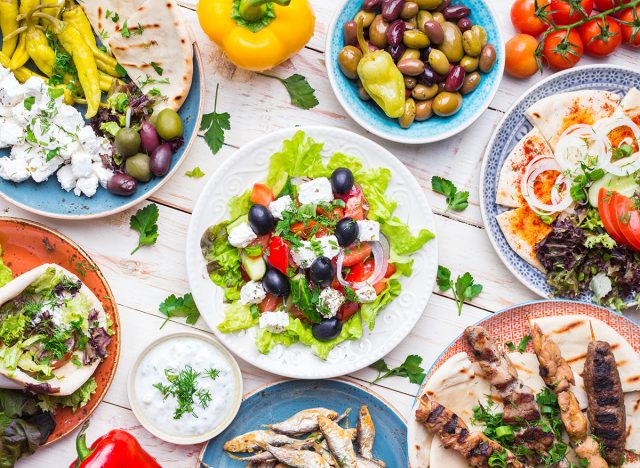If you're struggling with sleep quality, you may have already tried some of the most common suggestions out there—sticking to a regular sleep schedule, putting your phone away well before you close your eyes, and getting enough exercise. While these are all helpful tips with valid science behind them, you may be finding that they're not enough on their own. If you're looking for another change to help improve your sleep quality, consider taking a look at the foods you eat.
While we've known for a long time that dietary choices are linked to sleep quality, new research finds that one specific eating habit, following the Mediterranean diet, can especially help you fall asleep faster and stay asleep through the night. The new study, published in the Journal of the Academy of Nutrition and Dietetics, reviewed twenty previous studies published between 1975 and 2021 to compare diet composition to sleep quality. Researchers highlighted the Mediterranean diet as one that contained the main qualities linked with better sleep quality.
"It seems that those who eat more fiber, healthier fats (such as polyunsaturated fats), serotonin- and melatonin-rich fruits and vegetables, and anti-inflammatory nutrients (such as antioxidants, omega-3 fatty acids) have better sleep," study author Katherine Wilson tells Eat This, Not That! of the results. "But, more studies are needed to explain what drives these associations."
Related: The #1 Best Juice to Drink Every Day, Says Science

Wilson adds that a range of other habits, including limiting caffeine intake and screen use, could also help with sleep quality and that it varies from person to person, "almost like your fingerprint."
Even when it comes to your dietary choices, it's worth taking a more 360-degree view. So, if one particular habit change doesn't work for you, it's worth trying some other things out until you find the routine that works best for you.
"One thing that many people have difficulty understanding about the connection between food and sleep is that the existing data suggest that it is less about specific foods and more about overall eating patterns," says Michael A. Grandner, PhD, MTR, author of Sleep and Health.
"Taken together, the evidence suggests that overall healthy eating patterns, especially those that provide sufficient nutritional balance with most of the caloric intake focused more in the middle of the day, may be more beneficial to sleep health. Worrying about individual foods and nutrients may be missing the big picture."
For more on how to wake up feeling well-rested, check out these 20 Ways to Double Your Sleep Quality.
This Eating Habit Can Help You Sleep Better, New Study Suggests — Eat This Not That - Eat This, Not That
Read More


No comments:
Post a Comment